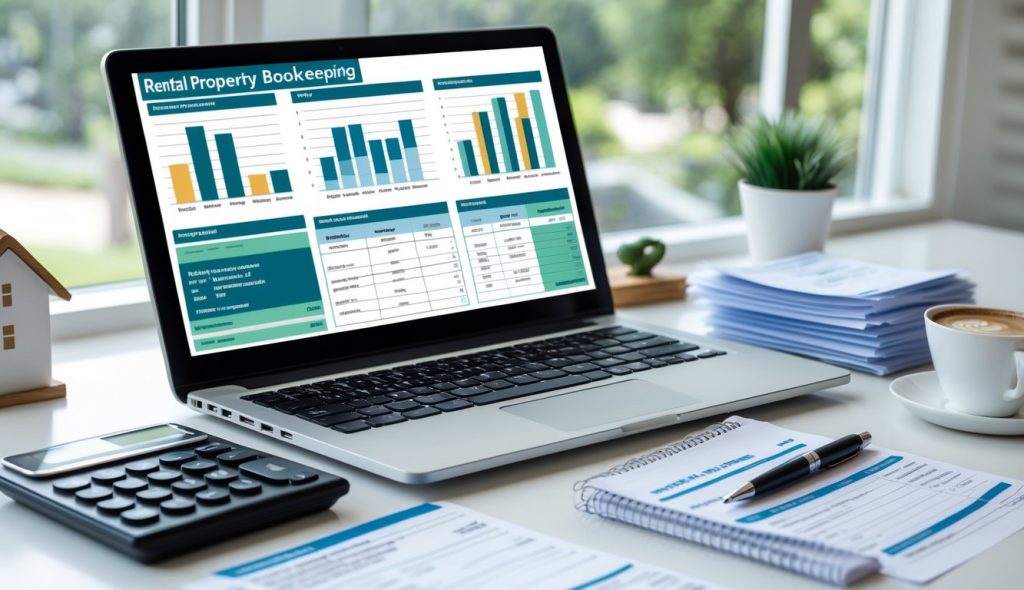How To Manage Your Rental Property Bookkeeping Like a Pro

Managing rental properties means you’re constantly juggling a bunch of important responsibilities. Handling rental property bookkeeping, collecting regular and prepaid rent, and keeping an eye on maintenance costs are just a few of the ongoing tasks on your plate.
With the right approach and tools, you can streamline how you work and feel confident your financial records are accurate. Let’s dig into some practical steps to simplify your rental property bookkeeping and make property management a little less stressful.
Key Takeaways
- Effective bookkeeping is essential for your rental property management.
- Using best practices can help you stay organized and efficient.
- Common tools and simple tips make managing your records easier.
The Basics of Rental Property Bookkeeping
If you’re a landlord, you really need to know which rental property expenses you can deduct. Deductible expenses typically fall into two categories: those you can write off in the year you pay them, and those you have to capitalize and depreciate over time.
Here’s a list of common deductible expenses for rental properties:
- Advertising
- Repairs and maintenance
- Insurance
- Legal and professional fees
- Property taxes
- Utilities (such as water, gas, and electricity)
- Cleaning and janitorial services
- Landscaping and gardening
- Snow removal
- Security services
- Leasing commissions
- Depreciation
- Interest (for mortgages or loans on the property)
- Bad debts
- Casualty losses
Depreciation needs a bit of special attention. You’ll depreciate residential rental property over 27.5 years, while commercial property spreads out over 39 years. If you buy a residential property for $200,000, your annual depreciation deduction clocks in at $7,273 ($200,000 divided by 27.5). A commercial property worth $1,000,000 would get you $25,641 per year ($1,000,000 divided by 39).
| Expense Category | Example(s) | Deductible When? |
|---|---|---|
| Repairs & Maintenance | Fixing leaks, painting | Same year |
| Property Taxes | Annual city/county taxes | Same year |
| Depreciation | Building value (not land) | Over 27.5/39 years |
| Insurance | Fire, liability, disaster | Same year |
| Professional Fees | Accountant, attorney | Same year |
Hang onto every supporting document—receipts, statements, the works—in case the IRS ever comes knocking. You can check out the IRS’s info on rental real estate income, deductions, and recordkeeping for a full rundown.
How To Keep Track of Rental Income and Expenses

If you want good accounting as a landlord, you’ve got to track rental income and expenses accurately and keep things organized. Start by recording every payment you get—rent, security deposits, you name it—and every payment you make for your property.
Rental income isn’t just monthly rent. It includes fees, security deposits (both refundable and non-refundable parts), and any other payments from tenants. Expenses are all those deductible items from earlier.
Popular methods for keeping records include:
- Spreadsheets (Excel, Google Sheets)
You get flexibility and can set up your own categories, track the date and details for each transaction, and use formulas to tally things up. - Rental bookkeeping software
There’s software just for landlords—think Stessa or Landlord Studio. These automate data entry, generate financial statements, and help you get ready for tax time.
| Method | Pros | Cons |
|---|---|---|
| Spreadsheet | Flexible, low cost, customizable | Manual entry, risk of errors |
| Accounting Software | Automated, generates reports, cloud back-up | May have subscription costs |
Whatever method you land on, make it a habit to update your records regularly. Keeping your financial statements and categories fresh gives you a clear view of cash flow and makes tax time way less painful.
Tips for organized recordkeeping:
- Keep business and personal accounts separate.
- Store all receipts and invoices.
- Schedule weekly or monthly check-ins to categorize and verify expenses.
- Maintain supporting documents such as lease agreements, insurance policies, and mortgage statements.
Common records to maintain:
- Rent rolls
- Expense receipts
- Bank statements
- Invoices
- Lease agreements
Working With an Accountant or Tax Professional
Teaming up with an accountant or tax pro can make managing your rental property finances a whole lot easier. A good professional helps you pick the right accounting method—cash or accrual—so you stay compliant with tax rules.
An accountant will spot every expense and deduction you’re allowed, which lowers your tax bill. They’ll also handle specialized stuff like depreciation and bad debts, and prepare your annual financial statements so you actually know how your rental business is doing.
When you bring your accountant organized records and supporting documents, tax return prep and filing get a lot smoother. Accountants also keep you in the loop about changing tax rules and help you plan for future investments with accurate budgets.
If you’ve got multiple properties or a complicated financial setup, a tax pro can set up efficient bookkeeping systems and give ongoing advice on tracking expenses and revenue. Honestly, this can save you time and help ensure your records are both accurate and ready for the IRS. If you’re more of a DIY landlord, combining automated tools like Landlord Studio with a good accountant gives you a solid foundation.
Tips for Streamlining Your Rental Property Bookkeeping
Using technology to your advantage
Technology can save you a lot of time and headaches. Property management software lets you automate stuff like tracking rent payments, scheduling repairs, and keeping all your important documents in one place.
These programs reduce manual errors and give you real-time updates on your property’s finances. Tools like QuickBooks, Excel, and rental property apps make financial reporting simple and give you instant access to your numbers.
For landlords with more than one property, or if you’re aiming to grow, specialized property management software is worth a look. These systems usually have online portals for tenants, reminders for lease renewals, and built-in maintenance tracking.
Comparison Table: Popular Bookkeeping Tools
| Tool/Software | Best Suited For | Key Features |
|---|---|---|
| Excel | DIY/bookkeeping beginners | Custom spreadsheets, formulas, reports |
| QuickBooks | Small to medium portfolios | Automated invoices, bank synchronization |
| Property Management Apps | Multi-property managers | Tenant portals, maintenance tracking |
| Paper Records | Traditional minimal portfolios | Physical folders, manual entry |
If you start using these technologies, you’ll probably cut down on paperwork, avoid losing important records, and find what you need way faster.
Keeping Organized Throughout the Year

Staying organized is really the base for efficient bookkeeping. If you keep things consistent, you’ll have a much easier time handling rent collection, tracking expenses, and prepping for tax season.
Start by gathering all your property-related receipts and tossing them in a spot just for this purpose. Honestly, digital folders help cut down on clutter and make it way easier to find stuff later.
Use a spreadsheet or property management software to log rental income and accounts payable each month. This gives you a snapshot of your finances as you go, so you’re less likely to miss deductible expenses.
For those little repairs or routine upgrades, jot down the date, amount, and which property it was for. It sounds like a lot, but it’s a lifesaver come tax time.
Keep your rental agreements updated, especially after lease renewals or any changes. Digital copies make it less likely you’ll lose them, and you can pull up a contract fast if you need it.
Track key dates like lease start and end, scheduled inspections, and important notices sent to tenants. Sometimes sticky notes or calendar reminders help if you’re the forgetful type.
Tips for Better Organization:
- Give each property its own folder or subfolder—both digitally and on paper, if you’re old-school.
- Block off time once a month to reconcile accounts and sort new documents. It’s less overwhelming than it sounds.
- Checklists for routine stuff like rent collection, inspections, or renewals actually work.
- Back up your files regularly. Seriously, don’t skip this unless you like living dangerously.
Want a more detailed workflow? There’s a good rundown of streamlined bookkeeping techniques for rental businesses you might want to skim.
Setting Up a System That Works for You

Creating a bookkeeping system that fits your style is essential, especially if your portfolio keeps growing. Figure out if you’re more comfortable with electronic records—something like QuickBooks or Excel—or if you’d rather stick with paper.
Whatever you pick, just stay consistent and double-check for accuracy. That’s what matters most.
Set up a separate bank account just for your rental activity. It’ll make tracking income and expenses so much easier, and you won’t dread your year-end review as much.
Customize your property management software or spreadsheet with categories like rent payments, utilities, repairs, management fees, and so on. You’ll thank yourself later.
Steps to set up your system:
- Pick your record-keeping platform: Decide if a spreadsheet, cloud accounting, or property management software fits your needs (and your patience).
- Structure your charts of accounts: Set up clear categories for expenses and income. It makes tax time less of a headache.
- Keep supporting documents handy: Attach or cross-reference receipts, invoices, and emails for every transaction. Doesn’t matter if it’s digital or paper—just make sure you can find it.
- Review your system regularly: Set a quarterly or monthly reminder to check your data and tweak things if your rental activities change.
Plenty of new tools let you automate parts of your bookkeeping by connecting software with your bank account or tenant payment portals. Stuff like REI Hub and cloud-based apps are built for real estate bookkeeping, and you can adapt them as you grow.
The best system is the one you’ll actually stick to. If you notice manual entry is slowing you down or causing mistakes, it might be time to try automated property management software.
Some folks just outsource bookkeeping to a pro, especially if their portfolio is expanding or their calendar is packed. No shame in that—it’s about what keeps you sane.
Frequently Asked Questions

How do I create a bookkeeping system for my rental property?
Start by opening a separate bank account for your rental property so you can keep personal and business finances apart. Set up a simple chart of accounts to sort income (rent, late fees) and expenses (maintenance, repairs, mortgage interest).
You can use spreadsheets, accounting software, or rental apps—just make sure you update records regularly. Organized documentation and tracking cash flow really help you avoid those classic bookkeeping errors.
What are the essential elements of a rental property deductions checklist?
Your rental property deductions checklist should cover:
- Mortgage interest
- Property taxes
- Insurance premiums
- Maintenance, repairs, and supplies
- Utilities you pay for
- Property management fees
- Advertising costs
- Depreciation
- Legal and professional fees
Keeping thorough records for these categories makes it much easier to justify deductions if the IRS ever asks. For more details, the IRS guidelines are worth a look.
Which accounting software is most suitable for small landlords managing rental properties?
Small landlords usually do well with straightforward property management software like QuickBooks, Stessa, or Buildium. These tools track income, expenses, and create reports you’ll need.
Many also have features for rent collection, tenant communication, and automating bookkeeping tasks. If you only have one or two units, a basic spreadsheet template might be all you need.
Can you provide an example of an effectively organized rental property bookkeeping template?
A simple spreadsheet works just fine, with columns for each type of income and expense. Here’s a quick example:
| Date | Description | Category | Income | Expense | Balance |
|---|---|---|---|---|---|
| 01/02/2025 | Rent received | Rental Income | $1,200 | $1,200 | |
| 01/10/2025 | Plumbing repair | Maintenance/Repairs | $150 | $1,050 | |
| 01/15/2025 | Insurance payment | Insurance | $50 | $1,000 |
Some landlords use templates from accounting apps, while others just make their own so they can tweak it as needed.
What are the IRS guidelines for documenting rental property income and expenses?
The IRS wants you to report all rental income and lets you deduct qualifying property expenses. Keep detailed records—receipts, invoices, bank statements, all of it.
For the latest details, check out the official IRS rental property income and deductions page.
What are the best practices for optimizing tax deductions on rental income?
- Track every deductible expense, and hang onto all the documentation you can.
- Set up a dedicated bank account just for rent payments and property expenses.
- Check for IRS updates each year—sometimes the list of allowable deductions changes and it’s easy to miss.
- Don’t forget about depreciation tax benefits; they can really add up over time.
- If things get complicated, talk to a tax professional who actually knows rental property inside and out.
Would you like to write a free blog post for Basic Property Management?
Are you a real estate professional, property manager, or industry expert with valuable insights to share? We welcome guest contributors who can provide unique perspectives and actionable advice for our community of property investors and managers.
Guest posting is an excellent way to share your expertise while building backlinks and connecting with our engaged audience of real estate investors and professionals. Best of all, there’s no charge to publish your post on our site!
